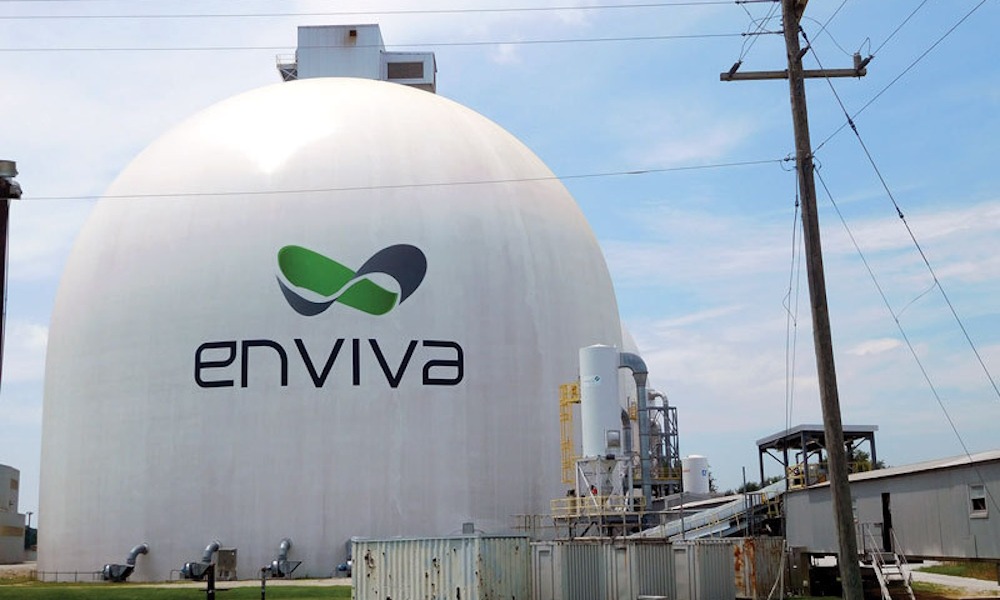Green energy superstar’s ascent and descent

Upon commencing construction of the world’s largest wood-pellet plant, Enviva secured contracts exceeding $20 billion to provide overseas power facilities with a coal alternative. The company’s stock approached a historic peak. That occurred two years prior. The Epes facility remains in the construction phase, while Enviva finds itself navigating bankruptcy proceedings. Demand has not presented a challenge. In Europe and Asia, subsidies for renewable energy are incentivizing electricity producers to utilize wood as a fuel source in place of fossil fuels. U.S. pellet exports are set to surpass the previous year’s record levels.
Enviva faces a dilemma: it committed to delivering more pellets to buyers than its production capacity allows, and at a price point that ultimately exceeded its production costs. Subsequently, it executed a calamitous transaction in an attempt to mitigate the deficit. The approximately $350 million trading debt incurred—owed to a German power producer, a key customer—compelled Enviva to seek bankruptcy protection in March, enabling the company to eliminate debt and attempt to renegotiate supply agreements deemed unprofitable. Enviva’s financial downfall has startled several of the country’s foremost clean-energy investors, contributing to the growing roster of financial letdowns within the ESG investment arena, which has amassed trillions of dollars for funds that pledge to align with environmental, social, and corporate governance objectives. Several companies, including emerging electric-vehicle manufacturers, have succumbed to bankruptcy, while elevated interest rates have adversely affected even those enterprises with established technologies, such as solar energy producers.
Concerns have been voiced by scientists and environmental organizations regarding the climate assertions made by the wood-pellet sector. Many scientists and environmentalists argue that burning wood is less efficient than burning fossil fuels, resulting in higher carbon emissions for the same amount of energy produced. The assertion is that the demand for pellets leads to the felling of trees that would otherwise contribute to carbon dioxide absorption in the atmosphere. The ascendance of coal in the 1800s averted the complete depletion of Western Europe’s forests for firewood. However, a 2018 letter to the European Parliament, endorsed by 772 scientists, cautioned against reverting to the combustion of forests as a substitute for coal.
Advocates of pellets argue that the calculations regarding climate impact are more intricate, asserting that the carbon dioxide released from the combustion of wood sourced from Southern pine forests is eventually reabsorbed by subsequent generations of trees that are cultivated. Proponents argue that this renders pellets not only renewable but also a carbon-neutral energy source. Furthermore, it is asserted that a significant portion of pellets is produced from mill waste and remnants from logging operations, which would release carbon if allowed to decompose.
Investors in the pellet sector have placed their bets on wood securing renewable-energy subsidies and supplanting coal in power generation facilities. Several years ago, private-equity firm Riverstone Holdings identified Enviva as a notable success amid its otherwise underperforming renewable-energy investments. The worth of its 43% stake in Enviva plummeted from approximately $3 billion in 2022 to under $20 million. Jeff Ubben’s Inclusive Capital Partners, previously the second-largest shareholder of Enviva, incurred losses exceeding $200 million from the liquidation of its largest position following the revelation of an unfavorable trade, as indicated by securities filings. Ubben’s social-impact investing firm has ceased new investments and is in the process of returning capital to its investors.
Power producers across Germany and Japan are relying on shipments from Enviva to maintain their customers’ electricity supply and fulfill renewable energy obligations. Enviva has persisted in its operations as it reduces debt and renegotiates long-term agreements with its clients. The Epes facility is set to commence operations next year. The financing was secured through tax-exempt bonds designated for green-energy initiatives, alongside public funds aimed at stimulating employment in a barren segment of the Tennessee-Tombigbee Waterway. A proposed facility in Bond, Mississippi, is currently suspended.
Drax, a prominent power producer in the U.K. and one of Enviva’s largest clients, claims it is owed over $75 million due to unfulfilled deliveries. Drax’s power station, located in the English countryside, utilizes approximately 7 million metric tons of pellets each year. The company has been augmenting its pellet production capabilities, highlighted by a recent $50-million expansion of its mill in Aliceville, Alabama, situated upriver from Epes. However, Drax continues to rely on Enviva for its pellet supply. “We have concentrated our efforts on ensuring the integrity of our supply chain,” stated Drax Chief Executive Will Gardiner in an interview. “We are capable of managing the risk irrespective of their outcomes.”
Enviva refrained from providing any commentary. Upon seeking bankruptcy protection, interim CEO Glenn Nunziata indicated that the filing would enable Enviva to reduce its debt, streamline costs, and enhance the operational efficiency of its mills. He asserted that this process would render Enviva “a more robust company with a solid financial foundation, better positioned to lead in the future expansion of the wood-based biomass sector.” The competition to lower greenhouse gas emissions has broadened the market for pellets—dried sawdust formed into cylindrical shapes—extending from wood-stove aficionados to large utilities keen on transitioning from fossil fuels.
Enviva was established by alumni of the University of Virginia’s business school and primarily financed by Riverstone. In 2010, Enviva acquired its inaugural pellet plant located in Amory, Mississippi. Corey Glenn, currently serving as the mayor of Amory, was previously employed by the original proprietors, who were private investors with connections to the local community. The initial strategy involved manufacturing pellets intended for use in grills and wood stoves, utilizing sawdust and shavings sourced from local sawmills. The implementation of renewable-energy subsidies by the European Union has enabled pellet producers to transition from selling by the bag to selling by the boatload. The Amory facility exclusively handles sawdust and wood chips. Following its acquisition by Enviva, Glenn assisted the company in pinpointing locations for new facilities, which now also utilize entire trees as part of their operations.
Enviva sought out locations where pulp mills had ceased operations, creating gaps in the market for trees deemed too small or otherwise unsuitable for lumber production. “Given the ongoing downturn in the paper and pulp industry, this has not posed significant challenges,” remarked co-founder and former CEO John Keppler in an interview with The Wall Street Journal in 2022. As of 2022, Enviva operated 10 facilities adjacent to six ocean ports in the Southeast, with intentions to construct an additional six, commencing in Epes. The majority of pellets are transacted through long-term contracts at predetermined prices; however, there exists a limited market for immediate deliveries. Following Russia’s invasion of Ukraine in February 2022, spot prices for pellets experienced a significant increase, mirroring the trends observed in coal and natural gas, as Western Europe imposed bans on Russian fuel exports.
In response to escalating demand, Enviva increased the transportation of tree trunks to its mills, prompting scrutiny regarding its assertions of primarily utilizing waste from external logging operations. In October 2022, Blue Orca Capital, a short-selling firm, released a report that questioned the validity of Enviva’s procurement and sustainability assertions. The assertion was made that the company lacked sufficient earnings to sustain its dividend payments without resorting to additional borrowing or issuing new shares, which would inevitably dilute the stakes of current investors. Blue Orca placed a bet on the decline of Enviva’s stock price.
“Enviva represents the latest in a series of ESG misadventures, driven by misguided European climate subsidies,” Blue Orca contended, asserting that the firm was exaggerating the ecological advantages of its pellets. “The presence of greenwashing within the company’s procurement practices calls into question not only Enviva’s viability as an ESG investment but also the prospective demand for its products.” Enviva contended that the report is rife with inaccuracies, reiterates earlier unfounded conjectures and significant misrepresentations, and arrives at dubious, misleading conclusions.
Enviva’s operations have been accumulating air-quality infractions and eliciting grievances from nearby residents regarding noise and sawdust emissions. Several facilities encountered mechanical issues that diminished production levels. In a recent filing related to its bankruptcy proceedings, interim CEO Nunziata disclosed that Enviva resorted to purchasing pellets from the spot market to meet its contractual obligations when production fell short. He recounted that when spot prices surged, that option was no longer viable, reflecting on events prior to his tenure with the company.
Enviva revealed in its 2022 financial report that it had committed to compensating customers to the tune of $141 million for the rescheduling or cancellation of deliveries. At that moment, it failed to reveal an agreement with the German power producer RWE, which was poised to result in significant financial losses. Enviva has entered into an agreement to purchase pellets from RWE, with plans to resell them at a premium. However, unseasonably mild winter conditions diminished demand and caused spot prices to plummet, resulting in Enviva needing to offload the pellets at significantly lower prices than those contracted with RWE.
In March 2023, a tornado struck a significant setback for Enviva, devastating its plant in Amory. In a subsequent meeting at the New York Stock Exchange, Enviva executives endeavored to assuage the apprehensions of investors. The company is set to uphold its quarterly dividend while simultaneously advancing its plant construction initiatives, as indicated in a recent transcript. Several weeks later, Enviva announced that it anticipated a loss approximately fivefold greater in 2023 than its earlier projections, and indicated it would cease dividend payments. The stock experienced a decline of 67% on that particular day.
Soren Aandahl, founder and chief investment officer at the short-selling firm Blue Orca, remarked in an interview that Enviva was “bleeding cash, and they were doing it in an environment that was pretty much the most favorable environment for them as possible.” In November of last year, Enviva disclosed the unprofitable RWE transaction, which had not been presented to its board at the time of execution. A dedicated board committee has engaged the law firm Baker Botts to conduct an investigation, as stated by Nunziata in a filing with the bankruptcy court. Riverstone, with its founders and two additional appointees occupying four of Enviva’s 13 board seats, has emerged as a creditor, asserting unspecified “damages caused by violations of the federal securities law.” Riverstone referenced shareholder litigation that claims Enviva misrepresented its procurement and environmental practices, as well as made deceptive statements regarding equipment failures at its plants.
In the previous month, Enviva put forth a proposal to emerge from bankruptcy, which would result in current shareholders retaining a mere 5% of the equity in a reorganized entity. Enviva’s plant in Amory, having sustained damage from a recent storm, has resumed operations; however, the company has accrued a number of outstanding debts within the local community. In the bankruptcy court, contractors, two hardware stores, and the municipal utility have lodged claims against Enviva, asserting that the company owes $161,000 for water and power services. In Epes, a small community with a population of fewer than 300, optimism prevails regarding the ongoing construction of the plant. Census data reveal that merely 30% of residents are employed, a figure that stands at half the national average. The region boasts an abundance of wood resources, with over 5 million acres of timberland situated within a 60-mile radius of the town.
Enviva’s choice to establish operations at the site of a wood-flooring plant that shuttered in 2019, along with the hiring of over 80 individuals, has been hailed as a significant victory for one of the most economically disadvantaged regions in the United States. To finance the construction, Enviva utilized Alabama and federal economic-development funds and issued $250 million in tax-exempt green bonds via the Industrial Development Authority of Sumter County.
Officials focused on economic development are currently striving to attract a dollar store to Epes, providing mill workers with a venue for their expenditures, according to Allison Brantley of the industrial development authority. Following the declaration of bankruptcy protection, Enviva’s executives reassured local officials that construction was proceeding as scheduled and that the company would fulfill its financial commitments, according to Brantley. In bankruptcy court, creditors from western Alabama have assembled. The Sumter County Tax Collector is pursuing approximately $97,000. The industrial development authority is seeking over $1.1 million, claiming this amount represents Enviva’s contribution to the expenses associated with dredging the port, which has remained inactive since the 1990s.










